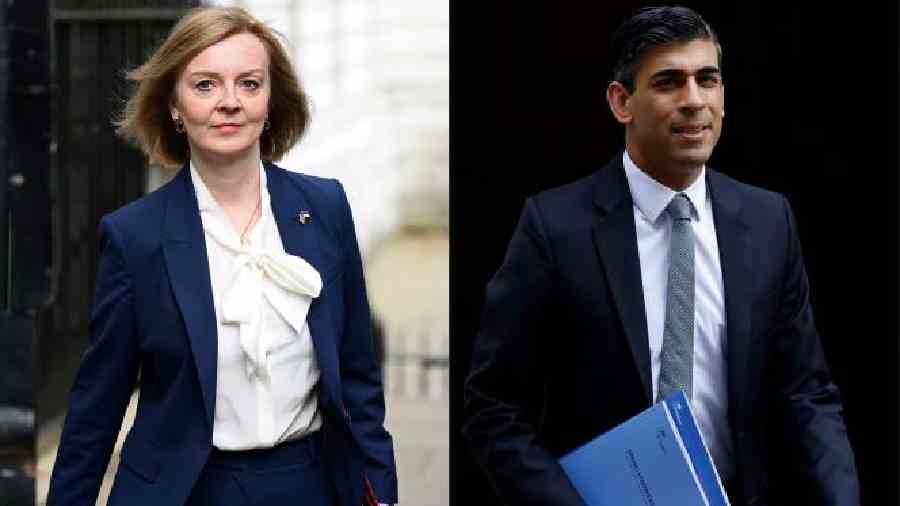Liz Truss could kick Rishi Sunak out of the Commons unless he votes for her budget and other economic measures in the Commons.
This was the implication behind a very loaded question put to him at the hustings held in Birmingham on Tuesday night as the Tory leadership contest draws to a close.
Opinion polls among a sample of 160,000 Tory party members who have already returned their ballot papers suggest Truss has taken an unbeatable lead although Rishi’s team still maintains the result is not a foregone conclusion.
The issue of whether Rishi would support Truss in the Commons was put to him by the presenter, John Pienaar, an experienced BBC political journalist who now works for the Rupert Murdoch-owned Times Radio, an offshoot of The Times newspaper.
What Pienaar was asking was whether Rishi would vote for Truss if she rolled back everything the former chancellor had argued for during the leadership debate.
For example, Truss has said she will cancel a rise in National Insurance and also in the corporation tax. Rishi has argued that if she borrowed £50 billion to stimulate growth, that would make it even more difficult to control inflation, which might rocket to 18 per cent next year.
It was a very pertinent question. As The Times put it: “He (Rishi) refused to say he would vote for what he sees as Ms Truss’s ‘unfunded tax cuts’ in the Commons if she wins the leadership race. He said: ‘You're getting into all these hypotheticals.’”
Pienaar did ask Rishi what he would do if Tory MPs were “whipped”.
This is a procedure under which “Whips”, who maintain party discipline, tell their backbench MPs that they have no option but to vote with the government — or risk being “deselected” at the next election.
An MP who is deselected is cast out of the party and cannot be chosen as its candidate at the next election. Already, there are murmurings among the most rightwing of Truss supporters that Rishi “should be packed off to California” (a reference to the green card he once held).
Nor is deselection an empty threat. On September 3, 2019, the Conservative Party under new Prime Minister Boris Johnson withdrew the whip from 21 of its MPs who had supported an emergency motion to allow the Commons to undertake proceedings on the EU (Withdrawal) Bill on 4 September. In the hours after the vote, the chief whip Mark Spencer informed the rebel MPs that they were no longer entitled to sit as Conservatives. This led to the loss of the Conservative/DUP majority in the Commons.
The suspended MPs included two former chancellors of the exchequer (Philip Hammond and the Father of the House, Kenneth Clarke), seven other former cabinet members (Greg Clark, David Gauke, Justine Greening, Dominic Grieve, Oliver Letwin, Caroline Nokes and Rory Stewart), and 12 others including Nicholas Soames, grandson of Winston Churchill.
On October 29, 2019, 10 of the suspended MPs had the whip restored. Six stood down at the December 2019 election, while four contested it as Conservative candidates; all four retained their seats. Of the 11 who remained suspended, six declined to stand at the election, while five stood as independents or Liberal Democrats; all five lost their seats.
In the December, 2019, general election, Boris swept to an 80-seat majority. That has come down to 71, so it would take a revolt by only 37 Tory MPs to make it impossible for Truss to govern. So the prospect, even allowing for a Truss honeymoon period, is —– and it is hard to see how he could vote for Truss’s economic plans — that could effectively end his political career.
What is odd is that he appears to be winning the debate in hustings after hustings. Two out of three Times writers though he was the winner in Birmingham.
Daniel Finkelstein said that “however good Truss may now be, she still trails Sunak, who is just a better performer. Particularly in his answers, he was fluent, tough and compelling. His opening comments about the flaws in the Truss plan — suggesting it would leave many people destitute — were particularly arresting”.
Katy Balls of The Spectator wrote: “It helped Truss that she focused on her own plans. She came across as confident and assured. This also played well to a party growing tired of blue-on-blue. As the frontrunner, she needs only to hold the line — and she did that.”
But Patrick Maguire, editor of Red Box, a Westminster email briefing set up, concluded: “Winner: on the clapometer, Truss. But Sunak won the argument.”











